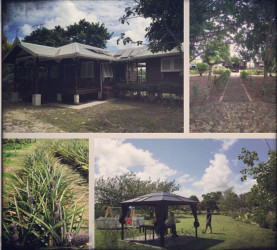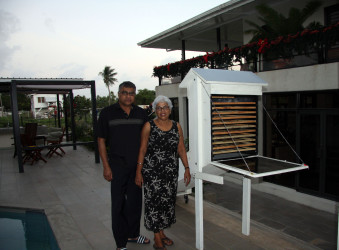At 65, Dr Shoba Gobin is showing no signs of altering her energetic lifestyle. Forty years (and counting) in the practice of medicine appear not to have satisfied her appetite for continually going forward and exploring new possibilities.
Two years ago, she created Gobin’s Farm & Kitchen at 45-46 Area ‘H’ Ogle, East Coast Demerara; a project that specializes in the production of seasonal dried fruits. Her partners in the enterprise are her husband, the well-known Gynaecologist Dr Neville Gobin and her children.
Gobin’s Farm & Kitchen was among the scores of participants in last month’s Business Exposition having been invited to participate by the Ministry of Business. Gobin still appears thrilled by what she says was a particularly enthusiastic public response to her products.

All 500 packets of product which she displayed at the exposition were sold out and she received several large orders from both local and overseas potential buyers. However, she has turned them down. Her infant enterprise, she has surmised, may not yet be ready to take that sort of plunge.
The business does solar dries and chops and mixes local fruit to create its own unique products. What perhaps makes its products more special is their delicious unpredictability. What you get is what is in season.
Two of Gobin’s three products, the ‘Yummy’ and the ‘Squibo Trails’ fruit mixes double as snacks and pleasing travel companions. The latter is mix of the fruit in season with spices to which cashew nuts and peanuts have been added for good measure. The former is simply a collection of tasty dried fruit.
At last month’s Business Exposition, Gobin’s Farm & Kitchen offered its 50-gramme package of Yummy for $200 and its 100g package for twice that amount. The 30g Squibo Trails sold for $200. The other product is a pepper sauce which Gobin has named ‘Hot Fuh So.’
Mindful, it seems, of the linkage between eye-catching brands and the marketability of her products, Gobin has carefully thought out the naming of her products. Squibo is actually an abbreviated form of Essequibo; and ‘Hot Fuh So’ is a literal interpretation of the common Guyanese expression. “I looked around for catchy names for my products,” she says.
Gobin is quick to make the health-related point that there is no added sugar or preservatives in her preparations. Local fruit, she says, has more than sufficient natural flavouring. She recommends consumption of her snacks by health-conscious consumers and hopes that they find their way into children’s snack and lunch kits.

Her husband is a not reluctant participant in the enterprise. He told Stabroek Business that he considered last month’s Business Exposition a very good initiative, making a particular point about the virtues of an event that allowed for the promotion of purely local products. He refused to hide his disappointment over the low turnout at the event. Nonetheless he hopes that there would be continuity to the event.
Gobin has become curious about what she has been told (by farmers and non-governmental agencies) is the abundance of fruit that go to waste because of a lack of processing capacity. She is currently focused on the rumoured waste of mangoes at Lethem and has been asked about the possibility of her manufacturing operation absorbing the glut. She wished she could respond but apart from the fact that her current operation could not handle such a significant influx of fruit she has not yet found a manufacturer who can produce her products to the high standards that she has set herself before she commits to expansion.
Still, she insists, there exists an obvious need for the local manufacturing sector to begin to seriously immerse itself in value-added products. She says that during her stay at the Business Exposition, she heard several stories of farmers complaining about heavy losses associated with what is, all too often, a glut of the fruit and vegetables that they cultivate. Where there may be a limited market, price is often an issue. She told Stabroek Business of a farmer she had met who had been reduced to offering his pumpkins at $100 each.
Four years ago, under considerable persuasion from their children, the Gobins bought a 15-acre farm at Parika. That has become the main source of the fruit for their manufacturing venture. They also entertain requests from schools to visit the farm.
At Ogle, where the Gobins live, a proliferation of plants lining the lawns pointed unerringly to a love of nature. Unsurprisingly, plants and cooking are among Gobin’s favourite pursuits.
The kitchen has become the centre of unending excursions into culinary experiments. During the interview, our reporter was encouraged to sample some of Gobin’s delights including cucumber juice and roasted cassava bread ‘buttered’ with cucumber relish. The relish, she informed, can also be used to add flavour to boiled channa and other snacks. When a new product emerges from Gobin’s kitchen, the staff of the Woodlands Hospital are pressed into service as willing tasters.
According to Gobin, their venture began with the purchase of 300 pineapple seedlings from a Parika farmer. Within 18 months they had reaped more than 1,000 pineapples. The big question that arose was how to deal with them. Selling was a challenge since the market was already saturated.
She talked about her pepper production too, boasting of harvests of around 100 pounds weekly. Some are sold but a great many still remain.
Apart from pineapple and pepper, there were other fruits including sapodilla, banana, mango and golden apple.
Once the glut of fruit became an issue a decision had to be made. That was when the idea of drying fruit and Gobin’s Farm and Kitchen was born. She turned to the internet for guidance where she unearthed a lengthy history of fruit-drying, including the process of removing the liquid and retaining the pulp. The extraction of water from fresh fruit causes the essential nutrients to become more concentrated and changes the overall appearance of the fruit. Much of the Gobins’ fruit is sold but the considerable leftovers go to her enterprise.
There are no pressures associated with the conventional business. Her enterprise is a hobby. “I am an Anaesthetist at the Woodlands Hospital,” she says.
She has employed two helpers to assist with the project which she oversees with all the seriousness of a professional. The weighing and packaging of the product are her personal responsibilities. Product integrity and presentation and integrity are matters which she takes seriously.
The venture has not been without challenges; reliable supplies of cashew and peanuts feature high on the list. Eventually, she settled for supplies of both from Lethem. There is also the high cost of packaging and labelling. The labelled packages cost around $90 each. They are imported from Trinidad and Tobago. Those costs plus the salaries of her workers means that she has to go into her own pocket. She is aware that the hefty subsidy cannot continue forever but there is no immediate choice.
Gobin is currently looking at alternative packaging. She is considering rice paper as a substitute for what she says is the current non-biodegradable packaging.
Finding committed farm hands is also a challenge. There are limits, she says, to what one woman can do. Apart from being a mother and grandmother, Dr Shoba Gobin currently serves as Chairperson of the Medical Council of Guyana and a member of the University of Guyana Council. She cannot be at the farm very often.
She is fretful about marketing in Guyana. She is unhappy about local supermarkets not having shelf space for local products. Still, she has had a fair measure of success with her own products. They can be found at Bounty Supermarket, Regent Street; A & S Mattai on Water Street; Real Value on Church Street; Oasis at the Cheddi Jagan International Airport as well as the Guyana Shop on Robb Street. Some of her product can be found at the Woodlands Hospital canteen. She also takes orders, including a recent one from Moray House. She believes that there should be a shop exclusively for “things Guyanese.”
She recommends a ‘marriage’ between Ministries of Agriculture and Business to assist in responding to the package and labelling challenge.
High fossil fuel electricity charges have pushed her in the direction of solar panels for the drying of fruit. She owns a solar dryer two solar freezers. The fruit is picked and stored at the farm before being transported to Ogle. There, it is peeled, cut and dried. A batch of fruit can take up to 12 hours to be properly dried. After drying the fruit is frozen. The next stage in the process is to place the fruit in an electric oven for fifteen minutes after which it is packaged and labelled and ready for distribution.
For the pepper sauce, peppers are roasted, then blended after which salt, coconut oil and vinegar are added.
Going forward, Dr Gobin says, she is currently in the throes of an experiment with manufacturing chocolate and fruit rollups. There is, it seems, no end to her adventure.





